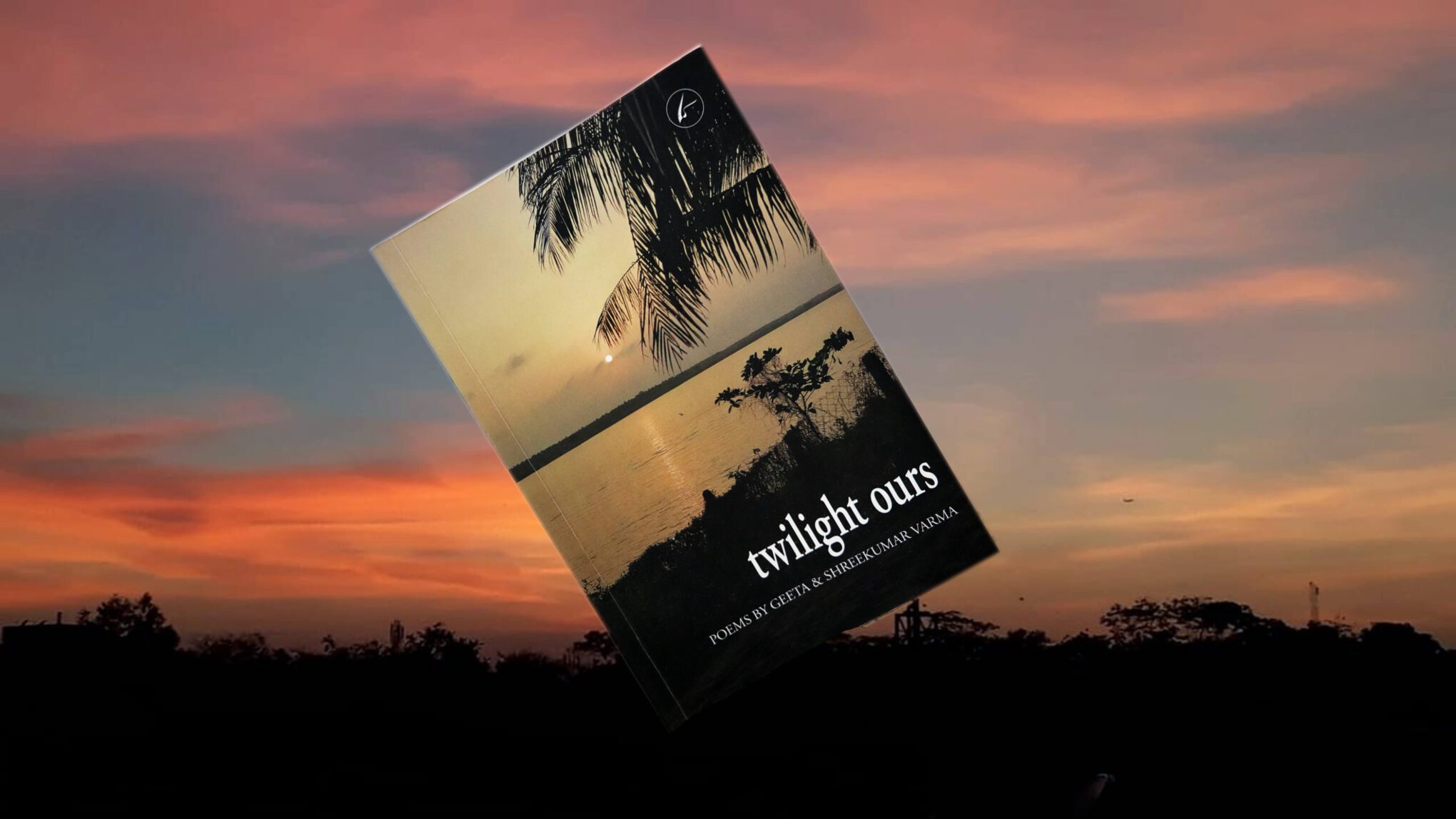Vidya reviews a book of poems, by the husband and wife duo, Shreekumar and Geeta. An exclusive for Different Truths.
Twilight Ours – Poems by Geeta & Shreekumar Varma
ISBN: 978-81-944096-0-1
Publisher: Adisakrit
Price: Rs 250/-
As I hold Twilight Ours in my hands, I feel a sense of serenity brought on by a golden sunset reflecting its glow on a placid river, and peeping through a silhouette of palm leaves and little plants by the river bank. For, this is the image on the cover that greets us to the book.
It’s is a collection of poems by Geeta and Shreekumar Varma.
As I hold Twilight Ours in my hands, I feel a sense of serenity brought on by a golden sunset reflecting its glow on a placid river, and peeping through a silhouette of palm leaves and little plants by the river bank.
For Shreekumar, award-winning playwright, novelist, children’s writer, poet, and former journalist, with eight books and eight plays to his name, Twilight Ours is his first poetry book. For Geeta, however, Twilight Ours is her second poetry book, and the first in collaboration with her husband. Geeta’s first poetry book—To My Violin is also published by Adisakrit.
Both Geeta and Shreekumar are brilliant writers, subtle in their expressions yet sparkly, and this is evident right from the cover page. And I don’t mean just the image. On the inner flap of the cover page are sample verses from the two that give us a taste of the sparkly brilliance that is in store for us to relish in the pages to come.
Geeta’s poems are about simple, straightforward, every day themes, and probably because they have a very practical approach, her verses often spring us a surprise about truths that are there for us to see but don’t. Like the verse on the cover flap where she asks, ‘Why frame pictures?’ and goes on to say:
They occupy space
Besides who would want them after us?
p 39.
Two poems where she uses the above mentioned literary device effectively are the one of the old couple who go to see their grown-up son, on p 20, and which also happens to be my favourite and the one of the gypsy children
In yet another poem, on p 30, she writes of a busy road scene and juxtapositions it against …men in ties chasing dreams. She is quite masterful in her use of juxtaposition in her narratives to convey the key elements of her poetry. Two poems where she uses the above mentioned literary device effectively are the one of the old couple who go to see their grown-up son, on p 20, and which also happens to be my favourite and the one of the gypsy children, on p 35:
The gypsy mother is cleaning
Radiating peace
Her mobile home of rags.
Geeta’s poems are laced with compassion, empathy, and maternal love, especially for Krishna.
Krishna,
You played a sad game
You left with your cows early,
Without telling me, your mother…
p 26
While her “Krishna” poems are all so endearing and intense with yearning, she writes about the mundane, everyday sights with the same fervour. Thus she sees a cart puller, p 43, looks for someone to give sweets away (p15), has a conversation with a girl selling flowers (p11), and wants to ask the lady called “Hare Rama” how she manages to survive (p 55), all through her poems, which is laden with imagery.
The soup poem, on p 14, is disturbingly stark, while the poem on p 48 is disturbingly maternal:
She cannot see the flaws, the imperfections
In her protection.
Her own children after all.
There is a cute little boat with an oar on a river bank that serves as a signature at the end of each poem.
A noticeable aspect of Geeta’s poetry is that she has not given any titles to any of her poems. There is a cute little boat with an oar on a river bank that serves as a signature at the end of each poem.
The boat signature is used with Shreekumar’s poems too (his poetry has titles) which come in the second half of the book. An exploration of his poems also begin with his verse on the cover flap—just three lines—a simple, straightforward statement on love.
i dare, so i love.
i dare to call the world
my own, so i love
But, isn’t that what love is—a simple dare? He effectively brings about this idea by “daring” to do away with capital letters, almost all through the poem
But, isn’t that what love is—a simple dare? He effectively brings about this idea by “daring” to do away with capital letters, almost all through the poem (p 97), even for the pronoun “I”. And so you go into his poems thinking that they are all going to be as straightforward and practical as Geeta’s was. And that’s when the might of Shreekumar’s pen hits you. Not that Geeta’s poetry was less powerful but her thoughts were easily accessible in the first read; subsequent reading then revealed the veiled agenda.
Shreekumar’s poems didn’t come to me in one reading. I had to read them a few times before I could comprehend them. Right from his first one in which he personifies a projector (p 75):
no-one notices me; the screen sparkles to life
to the deceptively simple “Laugh” (which is the last poem in the book, on p 118), his poems are intense with metaphors and layers of symbolism. Shreekumar, as ever, shows he always has the last laugh, so to speak.
However, unlike his plays which are interspersed with humour, his poems are filled with poignancy, pathos, and scope for profound contemplation.
However, unlike his plays which are interspersed with humour, his poems are filled with poignancy, pathos, and scope for profound contemplation. Can anything be more pathetic than the state of the old woman in the poem “Kumarakom” (p 106) which was written after the boat tragedy of 2002 or of the ‘day that goes on’ in the poem “Caught Unawares… anatomy of an acid attack” (p 116)?
The day goes on, the traffic roars.
We all play on, the game goes on.
There are a few poems that refer to “cycles” and “circles of life”. In “Silence of Words” (p 83), he says that
it’s not a happy world, but a seeking one,
never brought to fruition but by completing
the circle of life…
This seems to be an underlying theme of most of Shreekumar’s poems. In “The Art of Cycling”, he teaches his son the philosophy of riding a bicycle
This seems to be an underlying theme of most of Shreekumar’s poems. In “The Art of Cycling” (p 95), he teaches his son the philosophy of riding a bicycle:
let me pause and guide him on his way
and pat him for his speed, encourage him to take the curves
explain afresh the pleasures of dangerous riding
to race the steeps and dare the climb abetted by the wind.
and we wonder if these are life lessons too.
There is another one, “Cycle” (p 109), wherein he asks:
When shall I pause to return what I took?
and goes on to elucidate:
For every death there has to be a birth
The world has a balance it can’t stand to lose.
a reminder that humanity will have to pay for what we take from the earth.
One of my favourites is “Triumvirate” (p 77), a short poem laden with word play. He refers to the “Trimurthi” as “Triumvirate”:
Tripletting from our own heads
and describes them as:
wiseheaded, river-berating, caressmiling—
universes in a three-palm…born-grown-died
One must not miss out the use of oxymoron when he says we all are ‘contemprying sages’ (contemporary prying sages?) and the deliberate (mis)spelling of ‘aggloomeration’ to relate it to ‘joyous dark’ (another oxymoron).
One must not miss out the use of oxymoron when he says we all are ‘contemprying sages’ (contemporary prying sages?) and the deliberate (mis)spelling of ‘aggloomeration’ to relate it to ‘joyous dark’ (another oxymoron).
Just when you are wondering how Shreekumar has a way with words, you come upon “Silence of Words” (p 83) where he says:
a writer’s world isn’t filled by words
but by the silence of words…
reminding us of Keats’ lines:
Heard melodies are sweet, but those unheard
Are sweeter…
Yet again, in his poem “Words” (p 104), he says:
they jump out and touch
where it matters most
a relationship with words a poet enjoys.
Talking of relationship, the poem, “Night at the Marina” (p 78), has a tinge of sarcasm as the relationship between the man and his lady love is passion mixed with tact with the man asking his lady love:
‘I’d rather have a flat for us,
What will your father spare?’
and she, instead, takes
…his hand upon her cheek
‘I haven’t had a bite.’
But “Love Song” (p 80) and “Let Me” are filled with deep passion:
Who knows
what visceral vistas of pain
will lead me to you
in your mist-shrouded
mount of passion…
Reach out for Twilight Ours as a quiet read at the end of a hectic day when you want to end the day with something worthwhile.
Reach out for Twilight Ours as a quiet read at the end of a hectic day when you want to end the day with something worthwhile. This union of verse of Geeta and Shreekumar Varma is true to Geeta’s claim in the preface where she says, ‘…we are different in many ways—our ways of thinking and expressing are different, our styles are different, the way we see this world is different… Yet, somewhere we unite. And that is “twilight ours”.
Photo sourced by the author





 By
By
 By
By
 By
By
 By
By